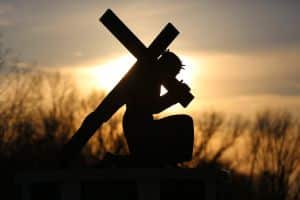
We’ve heard the popular saying: “If you don’t stand for something, you will fall for anything.” We nod our heads in agreement. Practically speaking, however, we wonder just what we are willing to stand for—even die for. We live in an age of “compromise.” Little by little, in the name of relativism, we have seen society drift away from God’s rules regarding Sunday worship, sexual activity, and even the respect for human life.
Today we are in need of models of courage—those who will stand up for their faith even if it results in death. Our first reading today is the story of such a man (2 Maccabees 6:18-31). His name is Eleazar.
“Eleazar, one of the foremost scribes, a man of advanced age and noble appearance, was being forced to open his mouth to eat pork. But preferring a glorious death to a life of defilement, he spat out the meat, and went forward of his own accord to the instrument of torture, as people ought to do who have the courage to reject the food which is unlawful to taste even for love of life.”
In the name of supporting the national religion, Jews were being forced to deny their faith by compromising its dietary laws. When it was Eleazar’s turn, he spat out the pork that was shoved into his mouth.
“Those in charge of that unlawful ritual meal took the man aside privately, because of their long acquaintance with him, and urged him to bring meat of his own providing, such as he could legitimately eat.”
The government officials liked and respected the noble man Eleazar. They came up with a “trick” in which it would appear that he was eating pork but was, in fact, eating kosher food. They offered to save the old man’s life.
“But Eleazar made up his mind in a noble manner, worthy of his years…and so declared that above all he would be loyal to the holy laws given by God.”
He explained the logic of his decision.
“At our age it would be unbecoming to make such a pretense; many young people would think the ninety-year-old Eleazar had gone over to an alien religion…Even if, for the time being, I avoid the punishment of men, I shall never…escape the hand of the Almighty.”
Had Eleazar given in, he would set a precedent for the others. And, so he stood his ground.
“When he was about to die under the blows, he groaned and said: ‘The Lord in his holy knowledge knows full well that, although I could have escaped death, I am…suffering it (the pain) with joy in my soul because of my devotion to him.’”
Only a martyr knows the possibility of inner joy in the midst of imposed suffering.
“This is how he died, leaving in his death a model of courage and an unforgettable example of virtue not only for the young, but for the whole nation.”
Eleazar’s final act of courage, even at ninety-years of age, sent out a message that gave hope and courage to his whole nation. Had he taken the easy way out, how many people would have used his example as a reason for compromising their own faith?
In our own time as the forces of secularism, expressed even in governments, bear down on our Christian beliefs, we pray that we, ourselves, can be models of courage to young people and even to our whole nation.
“But you, O Lord, are my shield; my glory, you lift up my head!” (Ps 3:4).
